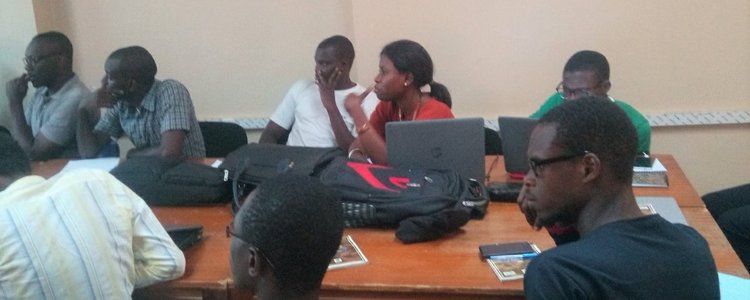The webinar, organised by the project Sustainable Energy Access for Sustainable Cities (SEA4cities), welcomed Professor Ibrahima Diédhiou, who shared with the guest audience his experience on the coordination of the research project on Jatropha crop for biofuel production. Prof. Diédhiou introduced to the audience, principally consisting of the project team and students from Ecole polytechnique’s Master 2 on Renewable Energies, key factors to make a research project successful.
First, he pointed out the importance of organising a kick-off workshop that raises awareness of the maximum of stakeholders when starting the project. At this stage it is necessary to communicate with all stakeholders, actors and beneficiaries, on the objectives of the project, its implementation canvas, and the role of each. He also stressed the need to involve local authorities who would support identification and commitment of relevant stakeholders for the project’s successful implementation. Recruitment of good scientists in the team is another factor of the project success; it ensures achievement of the project’s scientific objectives, pending the intervention’s impact in the field.
Looking back on his experience, Prof. Diédhiou mentioned the coordination of such projects can be arduous during the first months, and to pass this difficult stage a good communication is essential; first through traditional media such as the national press (e.g. Le Soleil). Word-of-mouth communication from actors to beneficiaries, and between beneficiaries also proved to be an important communication relay of a research project. On the internal communication within the project team, Prof. Diédhiou advised the identification of a facilitator who is able to both manage everyone’s changing moods and conciliate different ideas. In conclusion, Prof. Diédhiou stressed the importance of a good communication within the project team for a concerted action to reach out to project target beneficiaries.
Prof. Diédhiou’s introduction was followed by a 2-hour discussions session that mainly focused on the status of research on energy-related topics in Senegal, and on future perspectives. The SEA4cities national coordinator closed the discussions by thanking all for joining the team this afternoon, and invited everyone to join the next webinar scheduled in October.
Prof. Ibrahima Diédhiou is Director for Research at the University of Thies. He is coordinator of the Jatropha project that conducts research on social and environmental dimensions related to jatropha crop for biofuel production in the agro-ecologic region of the so-called “Groundnut basin” located in the center of Senegal.
Lors du 1er webinaire du projet Sustainable Energy Access for Sustainable Cities (SEA4cities), le professeur Ibrahima Diédhiou a partagé avec les invités son expérience acquise de la coordination du projet de recherche sur la production de combustible à partir du jatropha. Il a présenté à l’audience, essentiellement composée de l’équipe du projet et des étudiants en master 2 Energies renouvelables de l’Ecole polytechnique de Thiès, quelques-uns des facteurs qui permettent de mener à bien un projet de recherche.
Tout d’abord, Prof. Diédhiou a indiqué la nécessité d’organiser un atelier de lancement qui permettra une sensibilisation la plus large possible des acteurs et autres parties prenants au projet. Il s’agira de communiquer avec ces personnes, acteurs et bénéficiaires, sur les objectifs du projet, les grandes lignes de sa mise œuvre et le rôle dévolu à chacun. A ce niveau, il a également signifié la nécessité d’une adaptation aux réalités locales et d’un engagement des autorités locales pour identifier et impliquer toutes les personnes utiles à la mise en œuvre du projet. Le recrutement d’une bonne équipe de recherche est un autre facteur de succès du projet ; il permet de s’assurer l’atteinte des objectifs scientifiques, en attendant l’impact sur le terrain de la mise en œuvre.
Revenant sur son expérience personnelle, Prof. Diédhiou a souligné que la mise en coordination de tels projets est souvent laborieuse pendant les premiers mois et que pour passer cette étape, il fallait associer des relais de communication telle la presse nationale (exemple Le Soleil). Le bouche à oreilles d’acteurs à populations bénéficiaires puis entre bénéficiaires s’est également avéré être un bon relais de communication sur les projets de recherche. Quant à la communication interne au sein de l’équipe du projet, le Prof. Diédhiou a préconisé l’identification d’un facilitateur qui puisse gérer les humeurs et concilier les idées de chacun. En conclusion, Prof. Diédhiou a insisté sur le besoin d’une bonne communication au sein de l’équipe de recherche pour avoir une action concertée à destination des bénéficiaires du projet.
A l’introduction du Prof. Diédhiou, a succédé une séance d’échanges de plus de 2 heures avec les invités sur l’état de la recherche dans la thématique Energie au Sénégal et sur les perspectives. Le coordonnateur national du projet SEA4cities a clôturé les débats en remerciant tous les invités et en donnant rendez-vous à tous au prochain webinaire prévu au mois d’octobre.
Prof. Ibrahima Diédhiou est directeur de la Recherche de l’université de Thiès. Il est coordonnateur du Projet Jatropha qui mène une recherche sur les dimensions sociales et environnementales de la culture du jatropha pour produire du biocarburant dans la région agro-écologique du bassin arachidier, située au centre du Sénégal.
